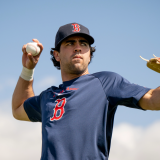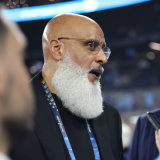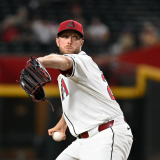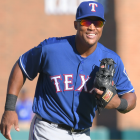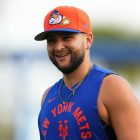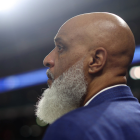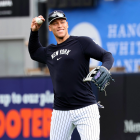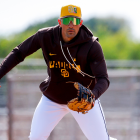
Who joins Baseball Hall of Fame ballot in 2024? Adrián Beltré and Chase Utley headline crop of newcomers
We know about the holdover candidates, but who is set to join them on the 2024 Hall of Fame ballot?

The dust has settled on the 2023 Baseball Hall of Fame vote. With eyes on next season, we can already start working up the ballot.
Scott Rolen has gained induction into the Hall of Fame with 76.3 percent. Jeff Kent has lapsed off the ballot after his 10 years. The following players received between five and 75 percent and haven't yet been on the ballot for a full 10 years, meaning they'll be back for another go next year:
Carlos Beltrán, Todd Helton, Billy Wagner, Andruw Jones, Gary Sheffield, Alex Rodríguez, Manny Ramírez, Omar Vizquel, Andy Pettitte, Jimmy Rollins, Bobby Abreu, Mark Buehrle, Torii Hunter and Francisco Rodríguez.
That's the starting point. Next up, the newbies.
The rules for the Hall of Fame dictate that a player must be retired for five seasons before being added to the BBWAA ballot. In recent years, the ballot has been anywhere from 25-35 players. That means for this next cycle, we'll be adding at least the following 10 names, in addition to at least a few others.
Adrián Beltré
Oh hell yes we're starting here. While I enjoy debates and getting to know more about past players over the course of years of research, it's also fun to get a no-brainer in there. We haven't seen anyone top 80 percent of the vote since Derek Jeter got close to 100 percent for the 2020 class. Beltré won't be unanimous, I don't think, but he will fly past 80 percent with ease.
We're talking about an incredibly likable, almost universally-loved player with an all-time great resume. He collected 3,166 career hits, which included 636 doubles and 477 home runs. He drove home 1,707 runs while scoring 1,524 times. He didn't top 100 strikeouts in any of his final 11 seasons. A career .286 hitter, he broke .300 seven times. All of that, along with his long-time exceptional defense at third base, puts him third in career WAR among third basemen after Mike Schmidt and Eddie Mathews. That's it.
And as a bonus, his Wikipedia page doesn't have "controversies" or "legal trouble" or anything like that, but it does have "charitable and humanitarian work."
The only thing I don't look forward to here is having to see the inevitable and desperate pleas for social media attention/engagement from alleged naysayers, whether voters or fans.
Joe Mauer
Mauer is a decent case for why we wait five years after a player retires before debating his credentials. Toward the end of his career, I just saw far too much negativity in his direction. We don't need to revisit the reasons right now. What we can do is look at his resume as a whole.
Mauer won an MVP and three batting titles. He also collected three Gold Gloves and five Silver Sluggers as a catcher. That type of skillset at that position is already rarified air. He hit .306 with a .388 on-base percentage in his career and though power wasn't his calling card, he still slugged enough to retire with a 124 OPS+. Among players who spent at least half their time behind the plate and appeared in at least 1,000 games, that's 13th all-time.
Mauer's 2,123 hits rank ninth among catchers, his 1,018 runs are 11th and his 428 doubles are third. He adds 143 homers and 923 RBI. In WAR, Mauer sits ninth among catchers, trailing eight Hall of Famers and sitting in front of the other eight. He's seventh in JAWS after Johnny Bench, Gary Carter, Ivan Rodríguez, Carlton Fisk, Mike Piazza and Yogi Berra.
Chase Utley
The six-time All-Star, four-time Silver Slugger winner and 2008 World Series champion is a Phillies legend. Over the course of his 16 big-league seasons, Utley hit .275/.358/.465 (117 OPS+) with 1,885 hits, 411 doubles, 259 home runs, 1,025 RBI, 1,103 runs and 154 stolen bases. He had three top-10 finishes in MVP voting, but never higher than seventh.
In Utley's time with the Phillies, he had a .402 OBP and .500 slugging with seven doubles, a triple, 10 homers and 25 RBI in 46 playoff games.
He still might be in for a fight. Absent the 2,000-hit barrier or eye-popping totals in anything else, he'll need to be reliant on the voters who like JAWS. He's 12th among second basemen, behind 10 Hall of Famers, Robinson Canó and Bobby Grich. He's ahead of several Hall of Famers like Roberto Alomar and Craig Biggio. He is just about even with the average JAWS of the current Hall of Fame second basemen, though he's a bit below it in WAR.
He'll end up faring better than the players with whom he's most connected in Jimmy Rollins and Ryan Howard, but it's gonna be close, I think.
David Wright
Injuries in the latter part of his career probably cost him, not entirely unlike Don Mattingly or Dale Murphy from the '80s. Through age 30, Wright was well on the way to having a Hall of Fame resume. He finished his career hitting .296/.376/.491 over nearly 1,600 games, a 133 OPS+. He also only got to 1,777 hits, 390 doubles, 242 home runs, 970 RBI and 949 runs with 196 stolen bases. Without finishing higher than fourth in MVP voting or a huge playoff dossier, it's hard to see Wright having a real shot. Sure enough, he's 26th in JAWS, well below the Hall standard and in the range of good players like Ron Cey and Josh Donaldson.
Matt Holliday
The seven-time All-Star won four Silver Sluggers, a batting title and an NLCS MVP and was a middle-order run producer for a World Series champion. In parts of 15 seasons, Holliday slashed .299/.379/.510 (132 OPS+). He racked up 2,096 hits, 468 doubles, 316 home runs, 1,220 RBI and 1,157 runs. He never won an MVP, but he was the runner-up once.
Due in part to some compiling in Coors Field and poor defensive scores, the WAR and JAWS component doesn't help. He's 36th among left fielders in both JAWS and WAR, sitting right with Brett Gardner and George Foster. Good players, but not Hall of Fame company.
Holliday would need to make a huge dent with the voting body in his counting stats and they aren't close to nice round numbers like 3,000 hits and 500 home runs.
Adrián González
The first overall pick in 2000, González had a very productive 15-year career. He led the league in hits, RBI and walks once apiece. He topped 2,000 hits (2,050) and had 317 home runs with 1,202 RBI, ending his career with a .287/.358/.485 (129 OPS+). The five-time All-Star drove home at least 100 runs seven times with three more 90+ RBI seasons. He finished as high as fourth in MVP voting while winning four Gold Gloves and two Silver Sluggers.
Among first basemen, González is 40th in JAWS and 43rd in WAR.
José Bautista
Remember when he became the biggest slugger in baseball? That was fun. After 59 career homers through his age-28 season, Bautista clubbed 54 in 2010 and 43 in 2011, leading the majors both seasons. He'd end up going to six straight All-Star Games and finishing in the top eight of MVP voting four times, including a third-place and fourth-place finish.
The peak was there.
Bautista finished his career a .247/.361/.475 (124 OPS+) hitter with 1,496 hits, 312 doubles, 344 homers, 975 RBI and 1,022 runs.
That peak was sure fun, though.
José Reyes
The four-time All-Star won the 2011 batting title and led his league in triples four times, steals three times and hits once. He finished a .283 hitter with a 103 OPS+, 2,138 hits, 387 doubles, 131 triples, 145 home runs, 719 RBI, 1,180 runs and 517 stolen bases. The triples and stolen bases seem to pop out, but he is 78th in career triples and 33rd in stolen bases.
Reyes sits 57th in JAWS among shortstops.
Victor Martinez
A professional hitter, Martinez quickly needed to move off being a full-time catcher to keep his bat at the level it needed to be. He ended up serving as DH more than any other position, though he wasn't far behind at catcher.
In nearly 2,000 career games, Martinez racked up 2,153 hits, including 423 doubles and 246 home runs. He drove home 1,178 while scoring 914 times and hit .295 in his career with a 118 OPS+. He was a five-time All-Star and two-time Silver Slugger, finishing second in AL MVP voting in 2014.
Even listing him as a catcher with those offensive stats, he's still only 30th in JAWS and 33rd in WAR.
Bartolo Colon
There's a Cy Young along with four All-Star games on Colon's record. He won 247 career games while striking out 2,535, too. His nearly-3,500 innings in the modern era is a huge workload as well.
But.
Colon's career 4.12 ERA (106 ERA+) and 1.31 WHIP leave a lot to be desired and show how much compiling he did late in his career at the expense of his run prevention. Oh, and there was a PED suspension.
Other possible first-timers: James Shields, Brandon Phillips, Yovani Gallardo, Doug Fister, Ryan Madson




